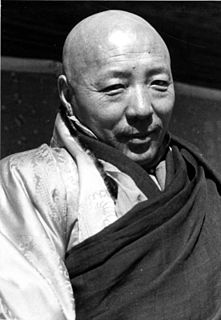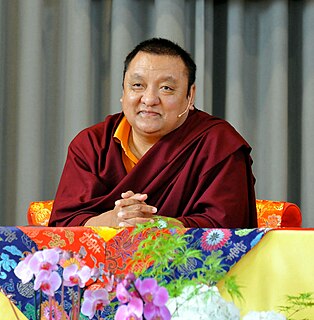
The Shamarpa, also known as Shamar Rinpoche, or more formally Künzig Shamar Rinpoche, is a lineage holder of the Karma Kagyu school of Tibetan Buddhism and is regarded to be the mind manifestation of Amitābha. He is traditionally associated with Yangpachen Monastery near Lhasa.
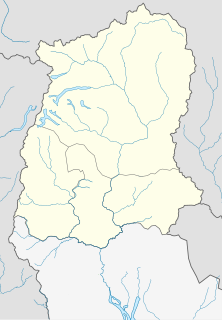
Rumtek Monastery, also called the Dharmachakra Centre, is a gompa located in the Indian state of Sikkim near the capital Gangtok. It is a focal point for the sectarian tensions within the Karma Kagyu school of Tibetan Buddhism that characterize the Karmapa controversy.

Ogyen Trinley Dorje, also written Urgyen Trinley Dorje (Wylie: U-rgyan 'Phrin-las Rdo-rje ; is a claimant to the title of 17th Karmapa Lama.

The sixteenth Gyalwa Karmapa, Rangjung Rigpe Dorje was spiritual leader of the Karma Kagyu lineage of Tibetan Buddhism. He was born in Denkhok in the Dergé district of Kham, near the Dri Chu or Yangtze River.
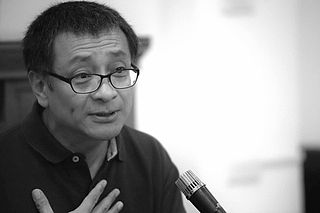
The 7th Dzogchen Ponlop is an abbot of Dzogchen Monastery, founder and spiritual director of Nalandabodhi, founder of Nītārtha Institute for Higher Buddhist Studies, a leading Tibetan Buddhist scholar, and a meditation master. He is one of the highest tülkus in the Nyingma lineage and an accomplished Karma Kagyu lineage holder.

Tsurphu Monastery (Tibetan: མཚུར་ཕུ་དགོན་པ or Tölung Tsurphu is a gompa which serves as the traditional seat of the Karmapa, the head of the Karma Kagyu lineage of Tibetan Buddhism. It is located in Gurum in Doilungdêqên District, Tibet Autonomous Region, China, 70 kilometres from Lhasa.

Lobsang Tenzin, better known by the titles Professor Venerable Samdhong Rinpoche and to Tibetans as the 5th Samdhong Rinpoche, was the previous prime minister, of the Central Tibetan Administration, or Tibetan government-in-exile, which is based in Dharamshala, India; Lobsang Sangay was elected to this position in April 2011.

Gaden Tharpa Choling Monastery is a Gelugpa monastery situated at the hilltop in Kalimpong, India. The monastery was founded by Domo Geshe Rinpoche Ngawang Kalsang in 1912. History says that Domo Geshe Rinpoche lived in Kalimpong in 1906 when he came to India for pilgrimage and to collect medicinal plants from India, Nepal and Bhutan. At the request of the Tibetan merchants and some Bhutanese leaders living in Kalimpong to establish a monastery there, Rinpoche instituted this monastery. Gaden Tharpa Choling monastery is a non-profitable development Association, registered under the West Bengal Societies Registration Act, 1961.

Palpung Monastery is the name of the congregation of monasteries and centers of the Tai Situpa lineage of the Kagyu school of Tibetan Buddhism as well as the name of the Tai Situ's monastic seat in Derge, Kham. Palpung means "glorious union of study and practice". It originated in the 12th century and wielded considerable religious and political influence over the centuries.
The Dance of 17 Lives is a 2004 book by UK journalist and author Mick Brown. It is the story of an exiled Tibetan teenager, the Karmapa, who has been hailed as one of the greatest spiritual leaders of modern times.
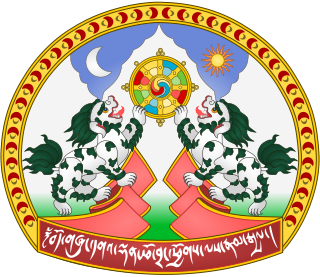
The Tibetan Parliament in Exile (TPiE), officially the Parliament of the Central Tibetan Administration, is the unicameral and highest legislative organ of the Central Tibetan Administration. It was established and is based in Dharamshala, India. The creation of this democratically elected body has been one of the major changes that the 14th Dalai Lama brought about in his efforts to introduce a democratic system of administration. Today, the Parliament consists of 45 members: ten members each from Ü-Tsang, Kham, and Amdo, the three traditional provinces of Tibet; the four major schools of Tibetan Buddhism and the traditional Bön faith elect two members each; four members are elected by Tibetans in the west: two from Europe, one from Australasia, one from North America and one from Canada. The Tibetan Parliament-in-Exile is headed by a Speaker and a Deputy Speaker, who are elected by the members amongst themselves. Any Tibetan who has reached the age of 25 has the right to contest elections to the Parliament.
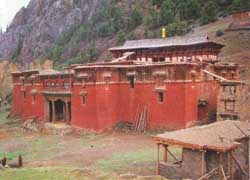
Karma Gon Monastery, the original monastery of the Karma Kagyu sect of Tibetan Buddhism, was founded in the 12th century by Düsum Khyenpa, the 1st Karmapa Lama in eastern Tibet at the age of 76. Karma Gon, is located on the eastern bank of the Dzachu River in Chamdo, eastern Tibet. Karma Dansa was the cradle of the karma kagyupas. When established the Karmapa had gathered 1000 monks around him here. Karma Gon was named as Karma Dansa as an administrative unit and the Chinese Ming Court enlarged the monastery’s jurisdiction by adding the Mekong’s middle and upper reaches. It was then also called Gama Dansa Si in Chinese.
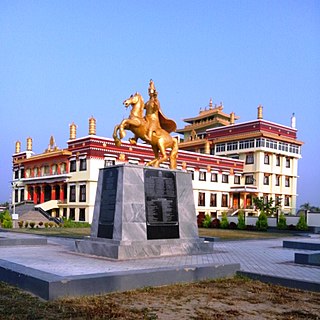
The Tibetan diaspora is a term used to refer to the communities of Tibetan people living outside their original homeland of Tibet. Tibetan emigration has three separate stages. The first stage was in 1959 following the 14th Dalai Lama's escape to Dharamshala in India, in fear of persecution from the People's Liberation Army. The second stage occurred in the 1980s, when China partially opened Tibet to foreigners. The third stage began in 1996 and continues today although with less frequency. Not all emigration from Tibet is permanent; today some parents in Tibet send their children to communities in the diaspora to receive a traditional Tibetan education. The 2009 census registered about 128,000 Tibetans in exile, with the most numerous part of the community living in India, Nepal, and Bhutan. However, in 2005 and 2009 there were estimates of up to 150,000 living in exile.
Orgyen Tobgyal Rinpoche, also called Tulku Ugyen Topgyal, is a Tibetan Buddhist lama who was born in Kham in Eastern Tibet in 1951, living in exile in India.

Padma Choling is a politician. He was the eighth and Chairman of the Tibet Autonomous Region (TAR), China, but in January 2013, was replaced by his deputy Losang Jamcan. Later he served as the Tibet Autonomous Region People's Congress. As Chairman of TAR, Choling was the "most senior ethnic Tibetan in the regional government", though he was subordinate to the TAR Communist Party Chief Zhang Qingli, and later his successor Chen Quanguo.

Protests and uprisings in Tibet against the government of the People's Republic of China have occurred since 1950, and include the 1959 uprising, the 2008 uprising, and the subsequent self-immolation protests.


